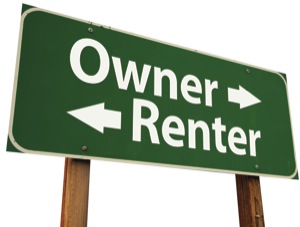
Whether to buy a home or rent one is a pressing question that does not have an easy answer. It is complex, ever changing and one to ponder again and again. The answer will be different for every questioner, as it is dependent on such variables as personal preferences and priorities, availability of different housing types in different locales and many other factors, both financial and intangible.
Let’s start with the pros and cons for each.
The pros. As a renter, the initial costs are significantly lower, though you may have a security deposit and possibly a broker’s fee. You don’t need to sacrifice a lot of cash for a down payment and most importantly, you have flexibility. If you decide you don’t like your rental or get a fabulous job offer in another state, you don’t have to wait long to sell, and just generally have more mobility. The pros of owning are mostly personal and intangible. You feel your home belongs to you and you can do what you want with the place.
Now the cons. Just reverse the pros and you pretty much have the cons.
But let’s dig a little deeper into the financial side. Which is less expensive, renting or owning?
Owning a home is costly. In addition to the down payment, you have mortgage payments, real estate taxes, general upkeep and repairs and maintenance. Many of these costs are unseen and unanticipated when you buy, as folks usually add up the mortgage, insurance and taxes and call it a day; they don’t think about the cost of replacing and repairing all the myriad parts of a house that need tending. As a renter, these unforeseen expenses are basically not the tenant’s problem.
As an owner, there’s also the question of the value of the money you are laying out for the down payment and closing costs. It is true that the longer you remain in the home, the better chance you have of amortizing these expenses, to compare more favorably with what you might have paid for rent. What would you be doing with those unspent funds if you decide to rent? With interest rates so low, a savings account will probably not bring you much reward, but think about it, what could you possibly do with that money? If you’re just going to keep it in the bank, home ownership with its possible future equity gain may be the right choice for you.
There is something devised called the price-to-rent ratio. This equation will help you to figure out whether rentals in your area are fairly priced as compared to sales prices. Let’s take an example of houses that cost $300,000 in an area where you might rent a comparable house for $2,500 a month.
It works this way. You divide the price of the house ($300,000) by the annual rent ($30,000). Your P/R ratio is 10. Let’s take another example. During the housing bubble, it was possible to rent a $200,000 house for $800 a month. In that case the P/R ratio would be 20.8. The nationwide normal P/R rate is between 10 and 14. The higher the P/R ratio, the less it makes sense to buy. So in the second example, where the ratio was over 20, it made better financial sense to rent.
You can find rent versus loan calculators all over the web to test a particular example. Common knowledge has it that you can probably afford a home that is 2.5 times your annual income, providing you have the requisite down payment. That means an income of $100,000 will warrant a purchase around $250,000. But this is a stringent formula that does not necessarily concord with current values.
In actuality, deciding to rent or own is a complex, multi-layered question. There are no easy answers. It’s just important to consider all the options and proceed with mindfulness.
Del Phillips is a California Licensed Real Estate agent. He is a member of the National, California and San Diego Association of Realtors. You can reach Del at Ascent Real Estate at 619-298-6666 or at Del@DelPhillips.com DRE LIC #01267333.











